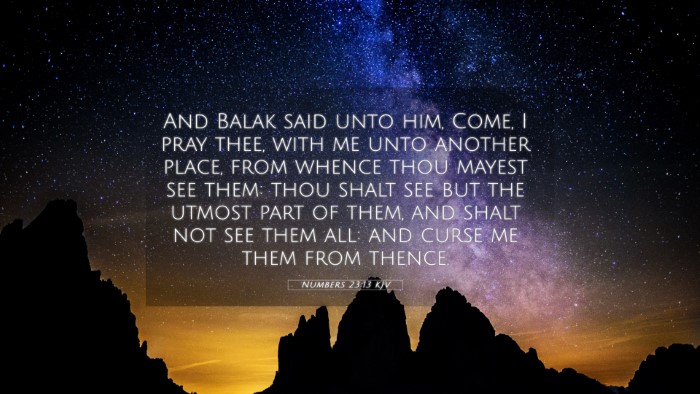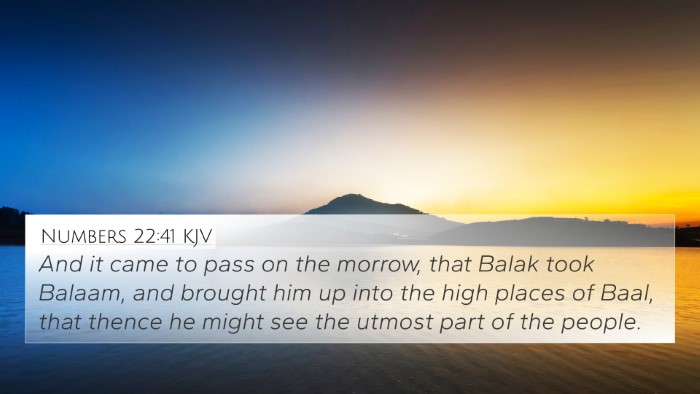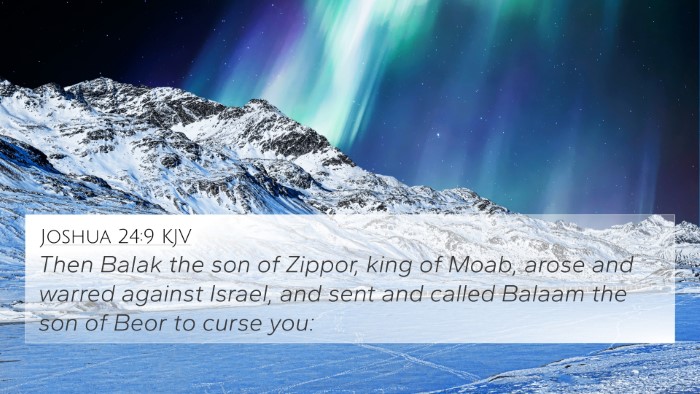Understanding Numbers 23:13
The verse Numbers 23:13 states, "And Balak said unto him, Come, I pray thee, with me unto another place, from whence thou mayest see them: thou shalt see but the utmost part of them, and shalt not see them all: and curse me them from thence." This verse captures a moment in the narrative where Balak, the king of Moab, seeks the prophet Balaam to curse the Israelites, seeing their large number as a threat.
Commentary Insights
Insights from various public domain commentaries illustrate the deeper meanings and implications of this verse.
-
Matthew Henry:
Henry focuses on the motives of Balak. He highlights Balak's persistent attempts to invoke a curse on Israel due to fear driven by their numbers and blessings from God. Henry emphasizes the futility of trying to go against God’s will.
-
Albert Barnes:
Barnes provides historical context, discussing how Balak's proposal reflects a strategic approach to weakening Israel's perceived invulnerability. He notes the shift in location as an attempt to alter the spiritual climatic conditions, underlining the significance of location in the defense against Israel.
-
Adam Clarke:
Clarke delves deeply into the psychological warfare at play. He analyzes Balak's fears, indicating that Balak recognizes the Israelites' strength and seeks to diminish it through spiritual means. He underscores the idea that such attempts to alter God’s plans are ultimately in vain.
Bible Verse Cross-References
Understanding Numbers 23:13 benefits from cross-referencing with several other scriptures. Below are links to verses that enhance the comprehension of this text:
- Genesis 12:3 - God's promise to Abraham that those who curse his descendants will be cursed.
- Exodus 23:22 - God’s assurance of protection for His people when they obey Him.
- Deuteronomy 23:4-5 - More insights into Balaam's role and the implications of cursing Israel.
- Isaiah 54:17 - “No weapon that is formed against thee shall prosper.” This emphasizes God’s protection over Israel.
- Revelation 2:14 - Uses Balaam as a warning against leading God’s people astray.
- Romans 8:31 - "If God be for us, who can be against us?" echoing the confidence of Israel's standing before their enemies.
- 1 Peter 3:9 - Advice against retribution and cursing, reflecting God's desire for His followers to embody love and harmony.
Thematic Connections
Numbers 23:13 not only serves as a historical account but also as a profound thematic connection within Scripture. The idea of using spiritual means to combat fears is a recurrent theme, found in both the Old and New Testaments, illustrating the ongoing dialogue about faith, God’s sovereignty, and human attempts to manipulate divine plans.
Conclusion
In conclusion, Numbers 23:13 presents a significant backdrop against which the futility of opposing God and the divine protection over His people become clear. By cross-referencing and studying associated Biblical texts, one obtains a richer understanding of the spiritual truths encapsulated within this verse. Exploring these connections can greatly enhance one’s Bible study experience.
Further Study and Reflection
For those engaging in cross-reference Bible study, this verse provides many avenues for exploration:
-
Tools for Bible cross-referencing: Employ resources like concordances and Bible reference guides to identify and connect similar scriptures efficiently.
-
Comparative analyses: Investigating how themes of blessing and cursing play out across different Biblical narratives can highlight the continuity of God's message.
-
Inter-Biblical dialogue: Examining the connections between the Old Testament teachings regarding Balaam and their applications in the New Testament sheds light on the evolving interpretation of these events.









